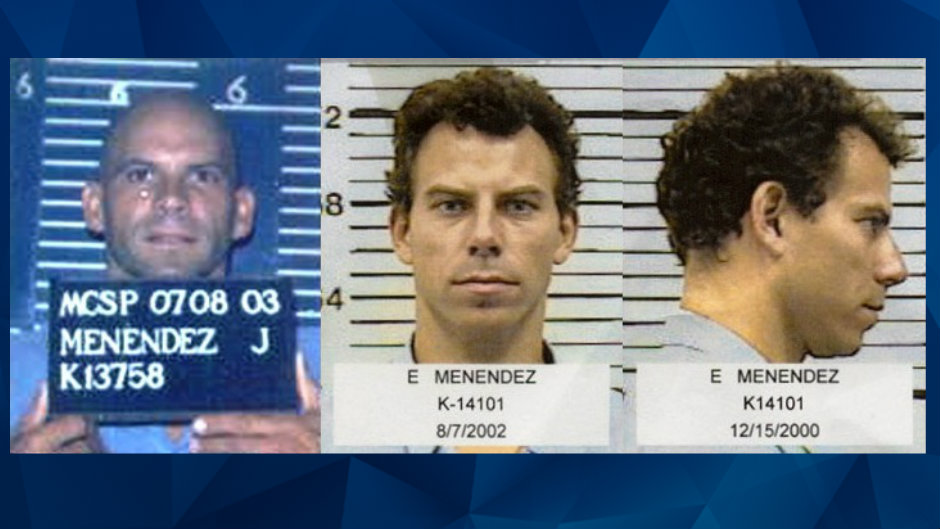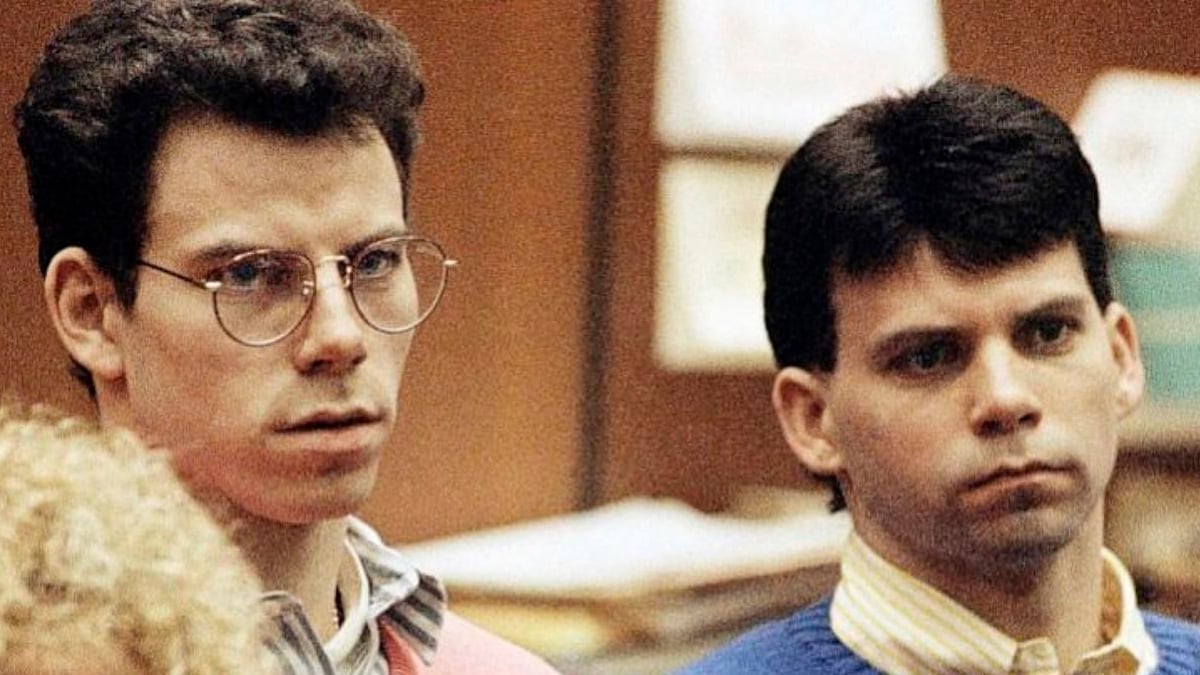Hey there, folks! If you’ve been following the twists and turns of the Menendez brothers case, you know it’s been a wild ride. This story has captivated the nation for decades, and now, the L.A. County District Attorney has dropped a bombshell that could change the game for Erik and Lyle Menendez. But before we dive into the juicy details, let’s set the stage. The Menendez brothers were convicted back in 1996 for the brutal murder of their wealthy parents, Jose and Kitty Menendez. Now, as they seek resentencing, the DA has made it crystal clear that there’s only one thing that could possibly make him reconsider their fate. Let’s break this down, shall we?
When you think about high-profile cases, the Menendez saga is one of those that just keeps giving. It’s not just about the murders themselves—it’s about the psychology, the family dynamics, and the legal battles that have unfolded over the years. The brothers have always maintained they were abused by their father, but the courts have consistently rejected their claims. Now, as they push for resentencing, the L.A. County DA has thrown a wrench into the works. What’s the one condition that could sway him? That’s what we’re here to find out.
Before we get into the nitty-gritty, it’s worth noting that this case isn’t just about the brothers—it’s about justice, accountability, and whether the system can truly deliver fair outcomes. The Menendez brothers have spent decades behind bars, and their fight for resentencing has sparked a national conversation about the justice system and its flaws. So, buckle up, because we’re about to deep-dive into the latest developments in this iconic case. Let’s go!
Read also:How To Wrap A Gift Creatively Unleash Your Inner Artist
Table of Contents
- Background on the Menendez Brothers Case
- L.A. County D.A.'s Statement
- Understanding the Resentencing Process
- Legal Arguments on Both Sides
- Psychological Factors in the Case
- Public Opinion and Media Influence
- Historical Context of the Menendez Case
- What the D.A. Must Consider
- Possible Outcomes for the Brothers
- Conclusion: Where Do We Go From Here?
Background on the Menendez Brothers Case
Alright, let’s rewind for a sec. Back in 1989, Erik and Lyle Menendez were just 18 and 21 years old when they allegedly gunned down their parents in cold blood. Jose and Kitty Menendez were found dead in their Beverly Hills mansion, victims of a shocking crime that sent shockwaves through the nation. The brothers initially claimed that their parents had been killed by intruders, but investigators quickly uncovered inconsistencies in their story.
Fast forward to 1996, and the brothers were convicted of first-degree murder and sentenced to life in prison without the possibility of parole. But here’s the kicker—their defense team argued that they were victims of years of physical and emotional abuse at the hands of their father. The brothers claimed that their actions were a desperate attempt to escape a toxic home environment. Despite their claims, the jury wasn’t convinced.
Now, after decades behind bars, Erik and Lyle are seeking resentencing. But the road ahead is anything but smooth. The L.A. County D.A. has made it clear that there’s only one condition under which he might reconsider their case. Let’s explore what that means.
Key Facts About the Case
- The brothers were convicted in 1996 for the murders of their parents.
- They claimed their father abused them physically and emotionally.
- The case has been the subject of numerous documentaries and TV specials.
L.A. County D.A.'s Statement
So, what exactly did the D.A. say? Well, folks, it’s pretty straightforward. The L.A. County District Attorney has stated that he will only “possibly reconsider” the Menendez brothers’ resentencing if new evidence emerges that fundamentally changes the narrative of the case. That’s a tall order, to say the least. New evidence would need to be rock-solid, something that completely alters the perception of the brothers’ guilt or innocence.
Now, this isn’t just some casual statement. The D.A. is under immense pressure from both sides of the debate. On one hand, there are those who believe the brothers deserve a second chance. On the other, there are those who feel the justice system got it right the first time around. The D.A.’s stance reflects a delicate balance between upholding justice and responding to public sentiment.
What Kind of Evidence Would Sway the D.A.?
Think about it—what kind of evidence could possibly change the D.A.’s mind? It would have to be something game-changing, like a confession from someone else or irrefutable proof that the brothers were not at the scene of the crime. But let’s be real—this is a case that’s been dissected and analyzed for decades. Finding new evidence at this point is like finding a needle in a haystack. Still, the brothers’ legal team is hopeful, and they’re leaving no stone unturned.
Read also:Winona Ryder Bjork A Unique Exploration Of Two Icons
Understanding the Resentencing Process
Let’s talk about how the resentencing process works. When a convicted individual seeks resentencing, it’s not as simple as filing a petition and waiting for a judge to make a decision. There are strict legal procedures that must be followed, and the burden of proof is on the petitioner. In the case of the Menendez brothers, their lawyers must present a compelling argument that warrants a reevaluation of their sentences.
Here’s the kicker—the resentencing process isn’t just about reviewing the original trial. It also involves examining any new developments that may have occurred since the original conviction. This includes changes in the law, new evidence, or even shifts in societal attitudes toward punishment and rehabilitation.
Steps in the Resentencing Process
- Filing a petition for resentencing.
- Presenting evidence and arguments to the court.
- Waiting for the court’s decision, which could take months or even years.
Legal Arguments on Both Sides
Now, let’s break down the legal arguments on both sides of the debate. The prosecution’s case is pretty straightforward—they argue that the brothers were convicted fairly and that there’s no reason to revisit the case. After all, the evidence against them was overwhelming, and the jury’s verdict was unanimous.
On the other hand, the defense team argues that the brothers deserve a second chance. They point to the brothers’ claims of abuse and the possibility that the justice system failed to fully consider the psychological impact of their upbringing. It’s a complex argument, one that touches on issues of trauma, accountability, and the limits of the justice system.
Key Legal Issues
- Was the original trial fair and impartial?
- Should new evidence be admitted, even if it wasn’t available at the time of the trial?
- How does the concept of rehabilitation fit into the equation?
Psychological Factors in the Case
Let’s talk about the elephant in the room—the psychological factors at play in this case. The Menendez brothers have always claimed that their father’s abuse drove them to commit the unthinkable. But is there any truth to their claims? Experts in the field of psychology have weighed in, offering conflicting opinions on the matter.
Some argue that the brothers’ actions were a direct result of years of trauma and abuse. Others, however, believe that their claims are nothing more than a convenient excuse. The truth, as always, lies somewhere in the middle. What’s clear is that the psychological impact of their upbringing cannot be ignored when evaluating their case.
Public Opinion and Media Influence
Public opinion has played a significant role in shaping the narrative around the Menendez brothers’ case. Thanks to documentaries, TV specials, and social media, the case has remained in the public consciousness for decades. Some people see the brothers as tragic victims of circumstance, while others view them as cold-blooded killers who got what they deserved.
The media’s portrayal of the case has also influenced public perception. From sensational headlines to dramatized reenactments, the media has both informed and shaped the way people view the brothers. It’s a double-edged sword—one that can either help or hinder their case for resentencing.
How Does Public Opinion Affect the Justice System?
Here’s the thing—public opinion can have a real impact on the justice system. Judges and juries are human, and they’re not immune to the pressures of public sentiment. While the justice system strives to be impartial, it’s impossible to completely separate legal decisions from the broader societal context.
Historical Context of the Menendez Case
To truly understand the Menendez case, you have to look at it in its historical context. This was a case that unfolded during a time when the justice system was undergoing significant changes. The 1990s saw a wave of high-profile cases that challenged the traditional notions of guilt and innocence. The O.J. Simpson trial, the Rodney King riots, and the Menendez case all contributed to a national conversation about race, class, and justice.
The Menendez case, in particular, highlighted the complexities of the justice system when it came to wealthy defendants. Critics argued that the brothers’ wealth gave them an unfair advantage in the courtroom, while others pointed to the systemic biases that affected poorer defendants. It’s a debate that continues to this day.
What the D.A. Must Consider
So, what exactly does the D.A. need to consider when evaluating the Menendez brothers’ case? First and foremost, he must weigh the evidence against the brothers’ claims of abuse. He must also consider the broader implications of his decision—not just for the brothers, but for the justice system as a whole.
There’s also the issue of public perception. The D.A. knows that his decision will be scrutinized by the media and the public. He must strike a balance between upholding justice and responding to the demands of the people he serves. It’s a delicate dance, one that requires both courage and conviction.
Possible Outcomes for the Brothers
What happens next for Erik and Lyle Menendez? There are a few possible outcomes. If the D.A. is convinced by new evidence, the brothers could be granted a resentencing hearing. This would give them the opportunity to present their case to a judge, who would then decide whether to reduce their sentences or grant them parole.
On the other hand, if the D.A. remains unconvinced, the brothers could spend the rest of their lives behind bars. It’s a sobering thought, but one that reflects the harsh realities of the justice system. No matter the outcome, the Menendez case will continue to be a source of fascination and debate for years to come.
Conclusion: Where Do We Go From Here?
Alright, folks, let’s wrap this up. The Menendez brothers’ case is a complex and multifaceted story that touches on issues of justice, trauma, and the limits of the legal system. The L.A. County D.A.’s statement that he will only “possibly reconsider” their resentencing if new evidence emerges highlights the challenges of revisiting high-profile cases. But here’s the thing—this case isn’t just about the brothers. It’s about all of us. It’s about how we, as a society, define justice and accountability.
So, what can you do? If you’re passionate about this case, take action. Share your thoughts on social media, write to your local representatives, or even start a conversation with your friends and family. The more we talk about these issues, the closer we get to finding meaningful solutions. And hey, don’t forget to check out our other articles for more insights into the world of law and justice. Stay tuned, folks—the story is far from over!


